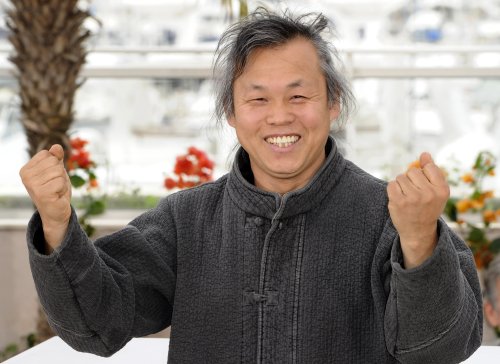Cinematic self-portrait ‘Arirang’ gains international recognition
Kim Ki-duk, one of the best known Korean auteurs overseas, received a coveted sidebar prize at Cannes on Saturday for his wrenching cinematic self-portrait “Arirang.”
Kim shared his Un Certain Regard best picture prize with German director Andreas Dresen, who received it for the film “Stopped on Track.”
“Arirang” is an emotionally raw cinematic piece written by, directed by and starring Kim, featuring his perceived failings as a director after going through a traumatic event and a series of “betrayals” by his colleagues in the film industry.
 |
Kim Ki-duk during a photo call for “Arirang” at the 64th Cannes International Film Festival in southern France on May 13. (AP-Yonhap News) |
Accepting the award, Kim sang the first few phrases of “Arirang,” Korea’s signature folksong which is the film’s namesake.
Kim’s film drew a lengthy standing ovation after its screening at Cannes on May 13. Contrary to its enthusiastic and positive reception at Cannes, however, “Arirang” is creating a stir in Korea’s film industry.
In “Arirang,” Kim aggressively pours out his anger and criticism toward his real-life colleagues, Korea’s movie industry and the government. In particular, Kim calls his former assistant director Jang Hoon a “betrayer.”
Jang became known with his first film, “Rough Cut,” (2008) based on Kim’s original screenplay. Shortly after the movie’s release, Jang signed up with Showbox, one of the major movie production companies in Korea. His next film, “Blood Brothers,” became a hit drawing 5.46 million viewers.
“I feel miserable that he betrayed me and signed a contract with a major producer for ‘Blood Brothers’ because he could not resist the temptation of capitalism,” Kim says in ”Arirang.“
In the movie, Kim also recalls a traumatic accident that occurred while shooting his 2008 film “Dream.” It happened as the movie’s main actress Lee Na-young was almost killed while filming a scene where her character hangs herself.
Kim, who has won prizes at Venice and Berlin for “3-Iron” and “Samaritan Girl,” never gained much popularity in Korea. He also criticizes the Korean government in “Arirang,” for failing to recognize the true value of his works.
“The government gave me an award for winning a prize at a foreign film festival,” he says in the film. “There were scenes where Korea wasn’t portrayed positively. Did they even watch the movie? What an irony.”
Kim disappeared from sight after the release of “Dream” in 2008, and did not make any money from “Rough Cut” as its distributor went bankrupt.
Kim sobbed during his interview with French broadcaster Canal Plus, after the screening of “Arirang” at Cannes on May 13, while singing “Arirang.” He also cries his heart out while belting out the same song in the movie. “I am most happy when I am making movies,” he says while sobbing in the film. “But devils are trying to stop me from making them.”
The movie has a shocking ending where Kim takes a handgun and sets out of his tent to “kill his betrayers.” After three gunshots are heard, the film ends with Kim pointing the gun at himself.
Another Korean director, Son Tae-gyum, won the third prize for his short film “Fly By Night” for Cinefondation section at Cannes.
By Claire Lee (
dyc@heraldcorp.com)







![[Robert Fouser] Accepting migrants in South Korea](http://res.heraldm.com/phpwas/restmb_idxmake.php?idx=644&simg=/content/image/2024/10/31/20241031050896_0.jpg)
